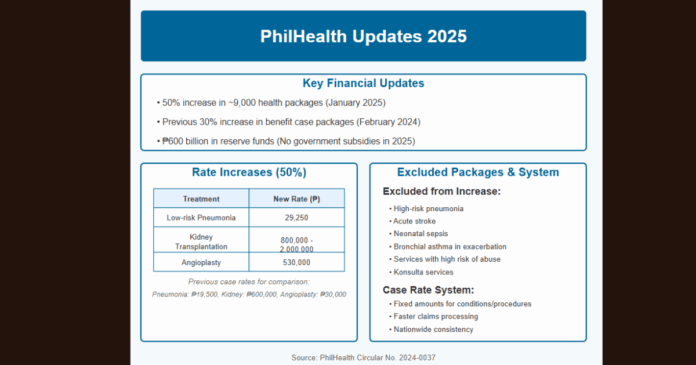The Philippine Health Insurance Corporation (PhilHealth) has made significant moves in its operations in 2025.
Since January 1, 2025, PhilHealth has implemented a 50% increase in about 9,000 health packages that cover hospital admissions. This came after the agency increased 30% of its benefit case packages in February 2024, aimed at reducing out-of-pocket expenditures for its members.
The adjustments were applied despite PhilHealth not receiving government subsidies due to its P600-billion reserve funds.
PhilHealth used a case rate system that has fixed amounts for medical conditions or procedures. This system allows for faster claims processing and consistency in how benefits are applied nationwide, regardless of the actual cost of the treatment. Instead of itemizing deductions on a bill that covers procedures individually, PhilHealth provides a standard reimbursement rate to the healthcare facilities for each case.
Despite receiving no government subsidy in 2025, PhilHealth claimed it is financially equipped to proceed with the adjustments, citing reserve funds estimated at over ₱600 billion.
According to PhilHealth Circular No. 2024-0037, the rate increase was intended “to increase support value, decrease out-of-pocket payment, increase financial risk protection, and ensure the effective delivery of high-quality health services.” The adjustment also aimed to more accurately reflect actual medical costs and align benefit values with inflation and service demands.
The 50% increase applies to various inpatient treatments and procedures. These include:
- Low-risk pneumonia: from ₱19,500 to ₱29,250;
- Kidney transplantation: from ₱600,000 to a new range of ₱800,000 to ₱2 million;
- Angioplasty: from ₱30,000 to ₱530,000.
However, several benefit packages are excluded from the increase, such as:
- Conditions under rationalization: high-risk pneumonia, acute stroke, neonatal sepsis, bronchial asthma in exacerbation, severe dengue, and acute myocardial infarction;
- Packages under re-costing: such as breast cancer and outpatient mental health care;
- Services with high risk of abuse: including cataract surgery and hemodialysis;
- Konsulta services under PhilHealth’s outpatient primary care program.



